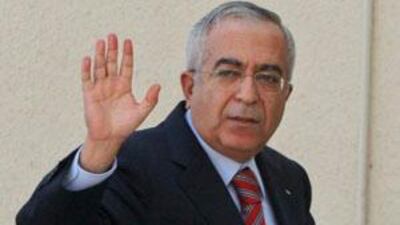RAMALLAH, WEST BANK // Salam Fayyad, the Palestinian Authority prime minister, tendered his resignation yesterday in a stated bid to smooth the way for unity talks between Fatah and Hamas. A statement from Mr Fayyad's office said the prime minister would leave his post no later than the end of March, when Palestinian unity talks in Cairo are supposed to end, or upon the formation of a national unity government.
"We believe that the positive atmosphere embodied by the first round of the dialogue is a precious opportunity that should be utilised to terminate the current state of fragmentation. The dialogue should serve as a solid foundation to achieve unity and reconciliation, which we have long asserted," the statement said. Mahmoud Abbas, the Palestinian president, said that he had accepted Mr Fayyad's resignation, but that the prime minister would remain in office until the results of unity talks became clear.
The resignation was not entirely unexpected. Since Palestinian unity talks began again in earnest in late February, Mr Fayyad's government had seemed on its last legs. Discussions in Cairo over a national unity government will probably focus on a factional government rather than one composed of independents, and although there is still an outside chance that Mr Fayyad could play a role in such an administration, Hamas seems likely to veto his participation.
The current government has been controversial from the outset. It was appointed after Hamas's takeover of the Gaza Strip in June 2007 and after Mr Abbas fired the Hamas-led unity government. Mr Fayyad's government spearheaded tough security measures in the West Bank that often targeted Hamas activists and contributed to his becoming a hated figure in Gaza. Hamas always considered Mr Fayyad's government unconstitutional and few tears were shed at his resignation in Gaza yesterday.
"The Fayyad government was illegal and it was time to correct this mistake," said Taher Nuno, a Hamas spokesman. Mr Nuno said Palestinian factions could now focus on unity talks in Cairo. "I hope we can concentrate on forming a unity government and that the dialogue will come to a positive end." Nevertheless, the antipathy towards Mr Fayyad in Gaza would seem to stem less from the West Bank security measures and his personal credentials and more from the fact that he accepted to head the current government in the first place. Mr Fayyad had served as finance minister in the sacked unity government and has consistently been keen to stress the importance of Palestinian unity. A well-respected economist, Mr Fayyad also went ahead with much-needed reform of the Palestinian Authority during his tenure. He introduced better financial oversight mechanisms and ensured that all government spending was centralised. He streamlined the PA's bloated wage bill to some degree by speeding up retirements that had been put on hold, while he also attempted to get some handle on the PA's outsized security budget. His government secured an unprecedented level of foreign financial assistance, even if most of that still remains in the form of unfulfilled pledges, and was instrumental in bringing donors to the table at a conference last week in Sharm El Sheikh for the reconstruction of Gaza after Israel's military offensive there this year. It is not clear whether Mr Fayyad would remain as acting prime minister should unity talks in Cairo fail. Mr Fayyad's letter of resignation stipulated that he would leave office "no later" than the end of the month, but reports suggest that the PLO's executive committee would accept his resignation only if unity talks succeed. Meanwhile, a Fatah spokesperson said the movement now expected a similar gesture from Hamas. "It would be appropriate if the illegitimate government of Ismail Haniyeh [the Hamas prime minister] took the same step," said Fahmi Zarir of Fatah. Ali Jarbawi, a political analyst and one of the independent members of the national unity committees in Cairo, said it was too early to say whether the resignation would spell the end of Mr Fayyad's political life in the short term. "Unity talks still have to reach fruition and there is no reason Salam Fayyad cannot play a role. We need good governance as well as unity. Hopefully we can get the best of both worlds," he said. Mr Jarbawi added that Mr Fayyad's resignation would not make a big difference to unity talks, however. "It will not hinder talks and should make clear that this government does not want to be an obstacle to any agreement. But it is not that significant [for the talks]," he said. okarmi@thenational.ae

